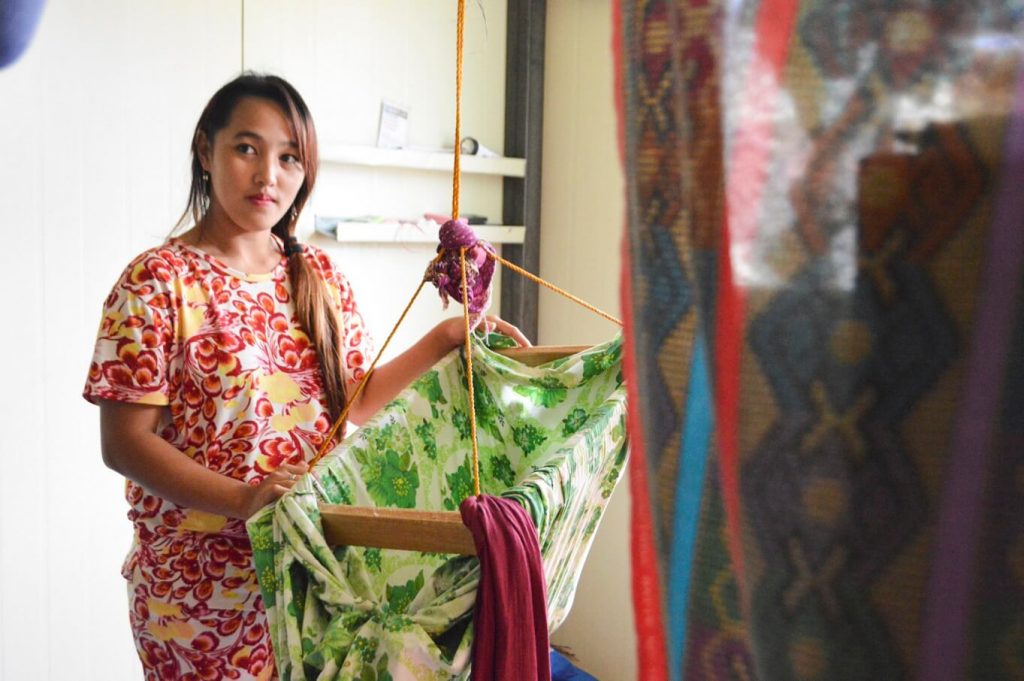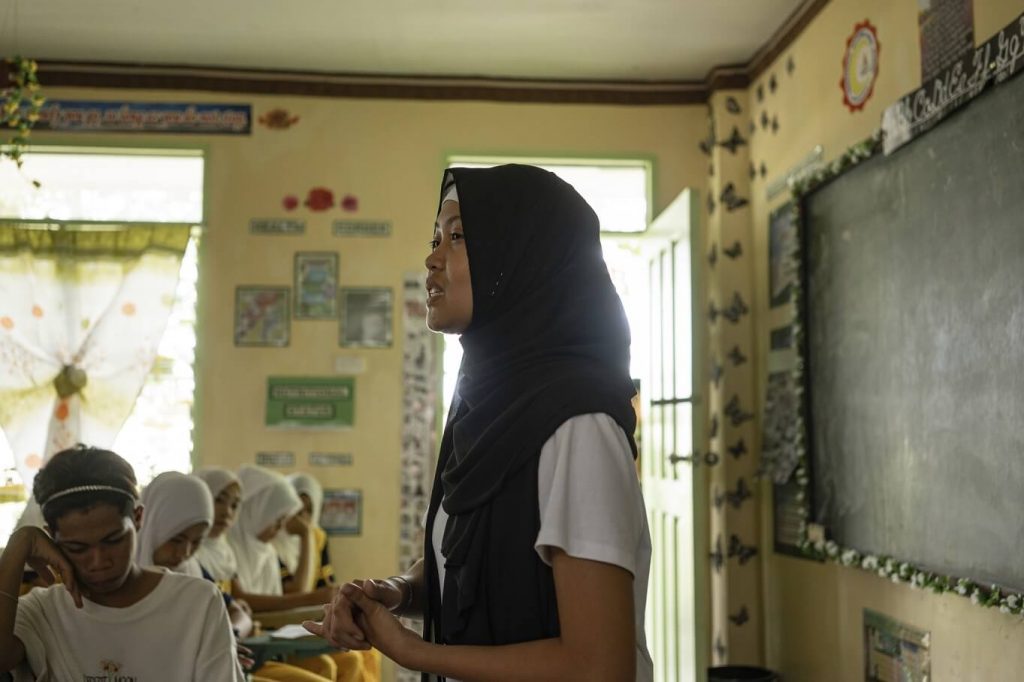Giving back girls their childhood: It’s time to end child marriage
“Marriage should be for adults, at the proper time, and out of free will.”
It seems like an obvious statement to make around marriage. But when you consider a country like the Philippines, which currently ranks 12th highest in the world as it relates to child marriage with 726,000 child brides, that statement by Filipino Senator Risa Hontiveros packs a little more punch. And it’s why the senator, along with several women’s rights organizations and Oxfam Pilipinas, have been working together for several years to make the proposed Girls Not Brides Act a law.
If the Girls not Brides Act, which is being pushed to a vote in the Philippines’ House of Representatives in January 2021, is enacted into law, child marriage will be prohibited and declared illegal, and any person who facilitates and/or performs a marriage would be criminally prosecuted.
FACT: A UNICEF study said 15 per cent of Filipino girls are married before their 18th birthday, with 2 per cent married before 15 years old.
The vote couldn’t have come at a more crucial time. With the global pandemic going into its seventh month, Sen. Hontiveros said she believes the “number [of child brides] may increase as many Filipinos will have been driven further into poverty, which is one of the main drivers of child marriages.”
If the Girls Not Brides Act does become law, it would be a major win for all involved – and yet, it would only be the first step in a long process of breaking down a societal system of entrenched gender inequality that has fostered child marriage as a norm in the Philippines.
READ MORE: What are the impacts of child, early and forced marriages?
“One challenge is the mixed reception from some stakeholder groups, as the bill goes against long-held cultural beliefs and practices,” Sen. Hontiveros explained.
“These systems of beliefs are often driven by economic contingencies. Incidents of child marriages increase in areas suffering from persistent poverty, disasters, armed conflict, and other crisis situations. Especially in conflict areas, internally displaced families are further driven into destitution that many marry their daughters off to relatives or other individuals who they feel could better care for them.”
From the Start: It Takes a Village
Violence against women along with child and early, forced marriage are issues that Oxfam Pilipinas in partnership with Women’s Rights Organizations – Al-Mujadilah Development Foundation (AMDF), United Youth of the Philippines-Women (UnyPhil-Women), Philippine Business for Social Progress (PBSP) and the Philippine Legislators’ Committee on Population and Development Foundation (PLCPD) – have been working on for years.
The impacts of child, early and forced marriage are stark. It subjects young girls to violations of their right to health, education and safety; an increased likelihood of dropping out of school; a higher risk of complications or death due to childbirth; economic vulnerability and an increased likelihood of domestic violence. Fundamentally, it means the loss of their childhood.

Noranisah was only 14 years old when she got married and her first child died in her womb. Now, at 22 years old she has four children. Photo: April Abello-Bulanadi | Oxfam
Since 2016, Oxfam Pilipinas has been implementing a program funded by Global Affairs Canada called Creating Spaces. Along with programming in the Philippines, the five-year initiative is also delivering support in Bangladesh, India, Indonesia, Nepal and Pakistan. Across all countries, Creating Spaces works at changing local norms and laws that perpetuate violence, provides support to women and girls who are survivors of violence, and improves strategies for changing gender norms by strengthening collective efforts and learning.
WATCH: Meet the Changemakers who are working with Oxfam to end violence against women and girls.
Due to years of work through the Creating Spaces program and the lobbying and influencing efforts by partners like the PLCPD, who led the initiative of getting the political heft; actions are coming to fruition. In 2019, Sen. Hontiveros, chair of the Senate Committee on Women, Children, Family Relations, and Gender Equality and a key Creating Spaces advocate, filed Senate Bill 162 or the ‘Girls Not Brides Act of 2019’.
As a parent of three daughters, Sen. Hontiveros acknowledged her privilege of being able to protect her own children from underage marriage but said she couldn’t pass on the opportunity to work on this issue.

Sen. Risa Hontiveros | Photo: Office of Senator Hontiveros
“I cannot simply sit idly by while other children are forced into situations that often lead to a life that deprives them of education, economic prospects, and more crucially, their dignity,” Sen. Hontiveros said. “Many studies have also shown that positive early experiences of children provide a foundation that could anchor them throughout their lifetime. A child marriage, however, is often marred by abuse and trauma, and once we expose our children to this kind of environment, their future is also jeopardized.”
In January 2020, Oxfam joined PLCPD, children’s networks, government agencies, and international and sectoral organizations to discuss various gender-related issues, provide recommendations and re-affirm solid support for the bill. In February 2020, Sen. Hontiveros, along with Senator Leila de Lima, filed a revised version of the bill, which incorporated recommendations by Oxfam to strengthen the participation of women and girls.
Girls are largely underrepresented and invisible in Philippine legislation and policy, and the senator hopes that through this bill, young Filipino girls will know that they are taken seriously.
“This bill is one of the first that says we listen to our girls, we care about their future, and we will protect them. It means that Congress does recognize the rights of young girls to childhood and to make decisions of their own free will in their different life cycles,” Sen. Hontiveros said.
Is one bill enough to be the collective tipping point needed to re-shape the norm?
It will be a start. But a hard right-turn away from an entrenched societal norm will take more time and more action.
“If it prohibits child marriage and dethrones it as a norm to be replaced by that of marriage between consenting adults, it will become a collective tipping point. It may not be enough to change beliefs overnight and in one fell swoop, but it will initiate a process that hopefully will become comprehensive,” Sen. Hontiveros explained.
“We always believe that legislation is necessary but insufficient to dismantle societal beliefs and lead to transformative processes of change. People and communities have to own the legislation; they must be made aware of it and truly understand how the law affects us.”
On March 4, 2020, in timing with International Women’s Day, Sen. Hontiveros delivered a sponsorship speech, which marked the first time the issue of child marriage and how to end it was discussed in a Senate plenary session in the Philippines. Following this speech, two Senate committees jointly recommended the early passage of the bill prohibiting child marriage in the Philippines.
Along with legislative and community support, Sen. Hontiveros and the organizations behind the bill said there must also be strong and effective implementation on the ground.
“There needs to be a collective effort among Local Government Units, government agencies in the Executive, civil society, and other stakeholders and advocates. Any legislation should always be integrated into the culture for shifts in norms to take place,” Sen. Hontiveros said.
On October 9, to commemorate International Day of the Girl Child and drumbeating the urgency of a law that will prohibit child marriage in the country, more than 200 ‘Girl Defenders’ joined an online rally (#GirlDefenders) organized by PLCPD, with support from Oxfam Philippines.
Several lady legislators attended the launch of the #GirlDefenders alliance, who are pushing to raise the minimum age of marriage for Muslims to 18 years old.
READ: https://t.co/1RauN6VXPD pic.twitter.com/cxC1xK5XqL
— Rappler (@rapplerdotcom) October 1, 2019
The rally saw lawmakers and campaigners from all over the Philippines wanting the same result – the immediate passage of the laws filed in both houses of Congress prohibiting child marriage. In addition to supporting the bills, the Commission of Bangsamoro Women said they will be pursuing an amendment of the ‘Code of Muslim Personal Laws’, which has been, in large part, used as a basis for enabling child marriage in the country.
“For the first time in history, there are measures filed in Congress that aim to end child marriage. Social movements like the #GirlDefenders alliance play an important role in shaping public policies and have mobilized the citizenry in achieving important policy reforms to end harmful practices ending child marriage,” Rom Dongeto, executive director of PLCPD, said.
On October 12, a historic moment in Philippine history was reached with the bill passing a second reading in the Senate a few weeks before the second regular session of congress closed. The third, and final, reading of the bill in the Senate, where only the title of the bill is read on the floor, was passed on November 9.
“All eyes are now on the House of Representatives. We need to bring this measure to the finish line. Once enacted into law, this landmark legislation will help protect the rights of young girls, defend them from different forms of abuse, and allow them to flourish and live to their fullest potential,” Oxfam Pilipinas Country Director Lot Felizco said after the news broke.
Now the approved bill will be sent to the House of Representatives for the same process. Once it’s passed in the House, it will go to the President who has the power to veto or approve the bill into law.

Hanod Ebrahim is a youth leader who is changing lives by using her voice to end child marriage in the town of Mamasapano, Maguindanao. Photo: Vina Salazar | Oxfam
These legislative milestones matter more now than ever. The economic slump triggered by the Covid-19 pandemic is likely to increase violence against women and girls, including child marriage. Partners with Oxfam’s Creating Spaces project from Lanao del Sur and Maguindanao have already reported an increase in child, early and forced marriage (CEFM) in evacuation centers during government-imposed lockdowns amid ongoing armed conflict. While survivors need immediate support services, people also need to know that there is a possible end in sight.
READ MORE: Creating Spaces – Uprooting our Beliefs
These insights reported by women’s rights organizations in Mindanao are extremely troubling – but not surprising as the risks of child, early and forced marriage are amplified during emergencies and disasters. The Covid-19 crisis and its far-reaching impacts underscore why measures to protect the girl child must be urgently enacted, including the Girls Not Brides bill.
All girls deserve their childhood. It’s about time to end child marriage.
Paula Baker is a former journalist and Oxfam Canada’s media officer.

